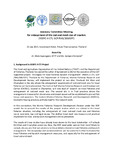Advisory Committee Meeting for Enlargement of The Cod‐End Mesh Size of Trawlers
Description
An Advisory Committee Meeting to discuss the enlargement of cod‐end mesh size of trawlers was held on 23 July 2015 at the Asia Airport Hotel, Patum Thani province, Thailand. A total of 70 participants attended the meeting: fishers (46); government officials (14); invited experts (4); and organizers and secretariat staff (6). The meeting participants exchanged ideas and discussed the results from the trawl experiments using cod‐end mesh size of 4.0 cm. This option has been presented and discussed, based on research results, among fishers and private processing agents and government officials in several meetings the project has been conducted and the work is still ongoing on the present year. The results on economic and social study were also discussed and topics such as trash fish production and fishmeal products were introduced to the meeting. Some important points relating to trawl fisheries in the new Fisheries Act were also pointed out. The participants generally understood and accepted the results from trawl experiment even though there would be some short‐term losses when a bigger mesh size is introduced. They in general agreed with the Department of Fisheries (DOF) to use the 4.0 cm for cod‐end mesh sizes for otter board and pair trawlers. However there were some participants opposing the idea of enlarged mesh size for all types of fishing gear, especially the Rastrelliger bottom gillnet. Another comment was to allow fishers to fish in wide fishing areas and not to force them to concentrate in one fishing area only. Some participants requested that if the mesh size regulation is implemented, then the active date should be postponed by one year because the present net (old cod‐end) can be used for three years after cutting. The fishers would need one year to change from an old net to a new net and so the government should provide some compensation to cover net cutting/mounting costs. It was noted that the types of fishing boats should be specified to include otter board and pair trawlers that catch only fish and should not be extended to those trawlers that fish for shrimp. In Thailand, most shrimps captured are small sized which are dried before marketing. A 4.0 cm mesh size would allow for many of these to escape and would not be meaningful for shrimp fishers. In the past DOF did not issue any mesh size regulations for trawlers. However, DOF has issued mesh size regulation for purse seine fishing net (not less than 2.5 cm), anchovy net (not less than 0.6 cm), light luring squid cast net (not less than 3.2 cm); crab net (bottom side net ‐ not less than 2.5”) and short neck clam dredge (not less than 1.2 cm). Fishmeal producers voiced their concerns that when the mesh regulation comes into action, trash fish quantities will be reduced (at present there are no trash fish coming from Indonesia and Myanmar). They also said that fishmeal used by processors is composed of trash fish (50%), fish skeleton and rotten fish (30%) and tuna processing waste (20%). Other comments from the meeting included the following:
• The monitoring MCS should be more effective.
• Public announcements should be made to improve understanding among stakeholders and government agencies, at the central and local areas.
• The fishers and fish processors noted that cod‐end mesh size could be enlarged to 5.0 cm when stocks have started to recover.
• Under the New Fisheries Act, 2015, the legal measure to cover the Thailand Offshore Fisheries is still not completed. Violators of the law will be imprisoned for up to one year, and will be fined 10,000‐100,000 Baht (Section 6).
Citation
Supongpan, M., & Parnjarat, S. (2015). Advisory Committee Meeting for enlargement of the cod‐end mesh size of trawlers. Training Department, Southeast Asian Fisheries Development Center.
Collections
- Country Activities [95]

